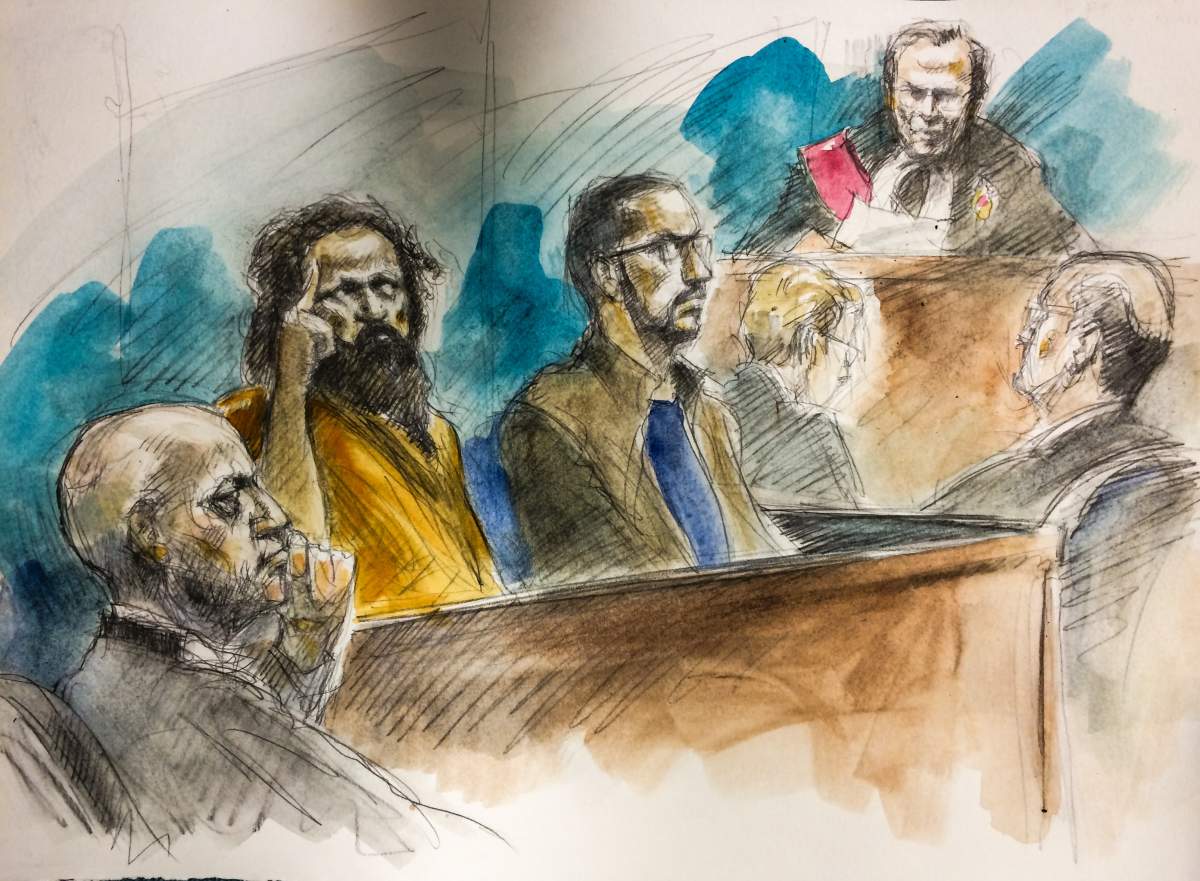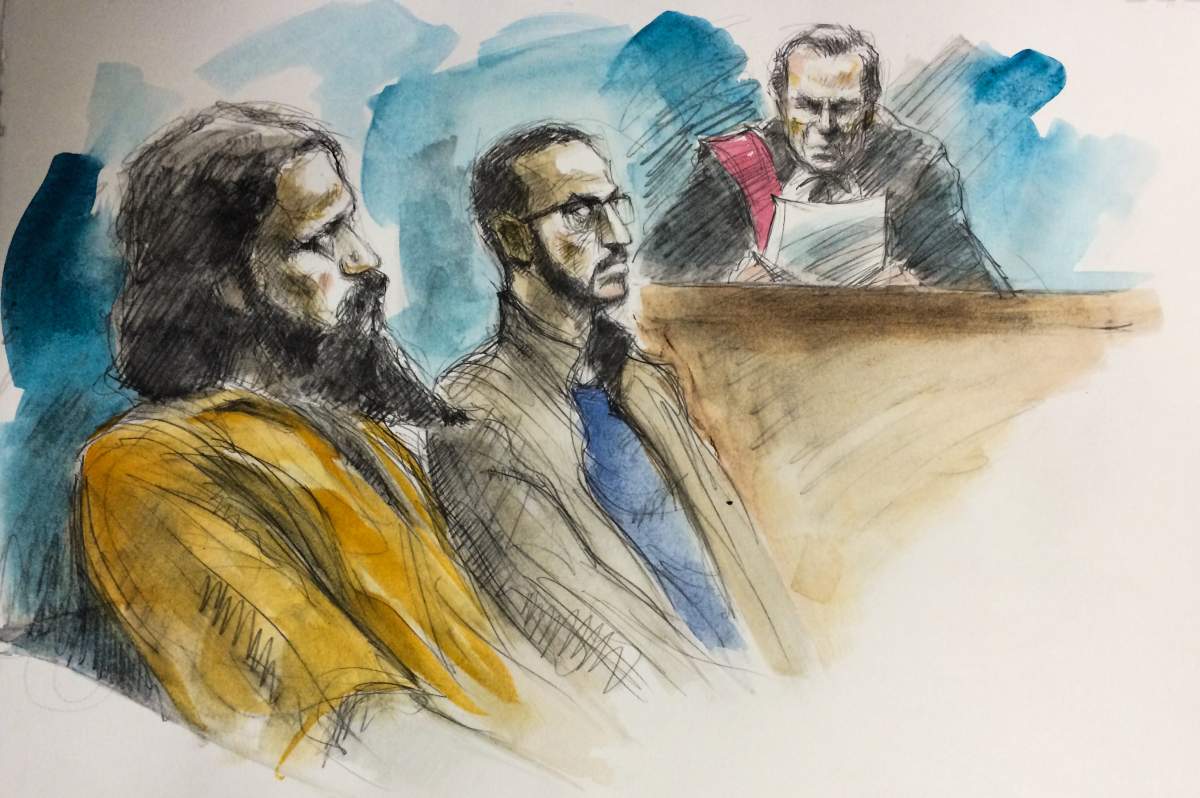Raed Jaser and Chiheb Esseghaier, found guilty of plotting to blow up a Via rail train, were sentenced to life in prison without parole for at least 10 years Wednesday afternoon.

Judge Michael Code dismissed two forensic psychiatrists’ findings that Esseghaier is severely mentally ill, actively psychotic, and probably suffering from schizophrenia.
Code said he isn’t convinced Esseghaier, who has insisted on representing himself, is schizophrenic — Code thinks he’s just a religious extremist.
READ MORE: Psychiatrist’s explosive testimony could derail Via terror trial
Previously the amicus appointed to advise the court on Esseghaier’s behalf had asked for Esseghaier to be hospitalized and treated for his illness, and for him to be assessed to determine to what degree, if any, mental illness influenced or was responsible for his actions.
Code rejected that request Wednesday, saying that justice demands the two be sentenced as soon as possible. But he did agree to have a psychiatrist assess Esseghaier once he’s in prison, likely in a Kingston-area penitentiary.
READ MORE: Canada’s sickest inmates are in its deadliest prisons
Code doesn’t buy arguments that entrapment was an issue in the case, which centred on evidence from an undercover FBI agent who befriended Esseghaier, then Jaser, and encouraged their violent plans.
And he thinks both Jaser and Esseghaier lack remorse for their actions and hadn’t renounced their beliefs. He isn’t optimistic either could be rehabilitated.
In March, a jury found Jaser and Esseghaier guilty of conspiracy to commit murder in support of terrorism and participation in a terrorist group. Only Esseghaier was found guilty of conspiring to derail a Via Rail passenger train heading from New York to Toronto by drilling a hole into a railway bridge under cover of darkness.
But the plot was never concretized: While Jaser and Esseghaier visited the site where they at one point discussed derailing a train, neither had advanced that plan at all and they had broken off contact altogether several months before their arrest in 2013.
Crown Croft Michaelson said there was “no evidence” Esseghaier was unfit to stand trial or mentally ill when he conspired to derail the train.
“If he is mentally ill, hopefully he’ll take advantage of the services available to him in the penitentiary system,” Michaelson told reporters outside court Wednesday.
“They have excellent services available in the penitentiary system, I understand.”
(As Global News has reported, inmates in Canada’s federal “psychiatric prisons” die and are assaulted at greater rates than anywhere else in the prison system. Both health advocates and law enforcement officials have said the justice and corrections system are overwhelmed by sick people who can’t get care behind bars.)
“[Esseghaier is] probably in a better situation than he would be if he was walking in the streets of Toronto,” Michaelson said.
READ MORE: Inmates with mental illness subject to ‘cruel and unusual punishment,’ suit alleges
Esseghaier, incensed by the sentencing, insists it’s impossible because he will die in December, 2014 (when he’s 33, like Jesus, as he’s said before.).
This could be the end of a high-profile terror saga, two and a half years after Jaser and Esseghaier were arrested in the spring of 2013, accused of plotting to blow up a Via Rail train near Toronto.
IN DEPTH: Via Terror Trial

Get breaking National news
Michaelson said the life sentences send a message to any would-be terrorists.
“There was one message that came out loud and clear today,” he said.
“If you commit terrorist offences in Canada with the intention of causing indiscriminate killing, you’re going to pay a very heavy price.”
Hundreds of pages of transcripts of recorded conversations between Jaser, Esseghaier and the undercover agent detailed wide-ranging, often fanciful plotting that included hiring a sniper to kill prominent Canadian Jews and trying to blow up a volcano in the United States.
Esseghaier’s behaviour has been erratic throughout the trial — he expressed disdain for both the secular justice system and an aversion to the number 3; he thinks it’s really 2014 and jail guards have conspired to shorten his days. But he wasn’t psychiatrically assessed until two years after his arrest, at the behest of amicus.
Forensic psychiatrist Lisa Ramshaw found Esseghaier to be so sick he’s unfit to be sentenced and unable to participate meaningfully in court.
“As a consequence of [Esseghaier’s] psychosis — that is, his loss of touch with reality and his delusional beliefs — it is my opinion that he is not able to communicate and participate in the court proceedings,” Ramshaw said last month.
Code disagreed with her assessment and ordered a second, this one from forensic psychiatrist Phil Klassen. Esseghaier, infuriated at Ramshaw’s assessment, refused to participate so Klassen was restricted to reviewing existing documents and recordings.
Klassen found Esseghaier to be psychotic and likely schizophrenic but did not think him so unwell as to be unfit to be sentenced.
Both Klassen and Ramshaw said it’s likely Esseghaier’s illness is the culmination of years-long decline.
READ MORE: What happens to Chiheb Esseghaier?
Esseghaier’s mental state has focused scrutiny on the case: The FBI has been criticized by human rights groups for targeting people in terror stings who are either extremely vulnerable or mentally ill.
A Human Rights Watch report last year highlighted what it termed a disturbing pattern of targeting vulnerable people in FBI terror investigations.
The report accused the FBI of conducting “discriminatory investigations, often targeting particularly vulnerable individuals (including people with intellectual and mental disabilities and the indigent), in which the government—often acting through informants— is actively involved in developing the plot, persuading and sometimes pressuring the target to participate, and providing the resources to carry it out.”
“We’ve documented cases of the FBI knowing someone suffered from a mental illness and continuing to pursue them anyway. … The same sorts of allegations are popping up in the Canadian cases,” said Human Rights Watch deputy Washington director Andrea Prasow.
“Particularly when you’re looking at people who are vulnerable because of a mental or intellectual disability … I think there needs to be greater scrutiny.”
Jaser’s lawyer John Norris may appeal the decision; Esseghaier doesn’t have a lawyer so his options aren’t as clear, but amicus may apply for leave to appeal on his behalf.
Vaughan-Woodbridge Conservative candidate Julian Fantino applauded the sentence in a statement Wednesday.
“With over forty years in law enforcement, I know firsthand that the threat of terrorism is real. I applaud the verdict and welcome the life sentence for Raed Jaser and Chiheb Esseghaier, who plotted to kill Canadians in a brazen terrorist attack.”









Comments